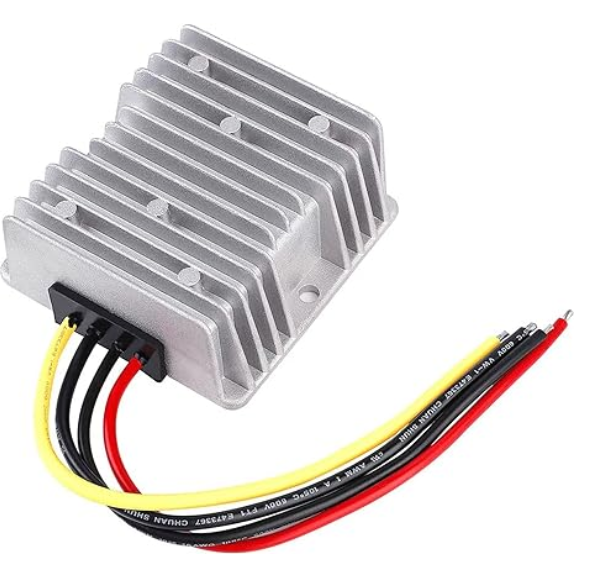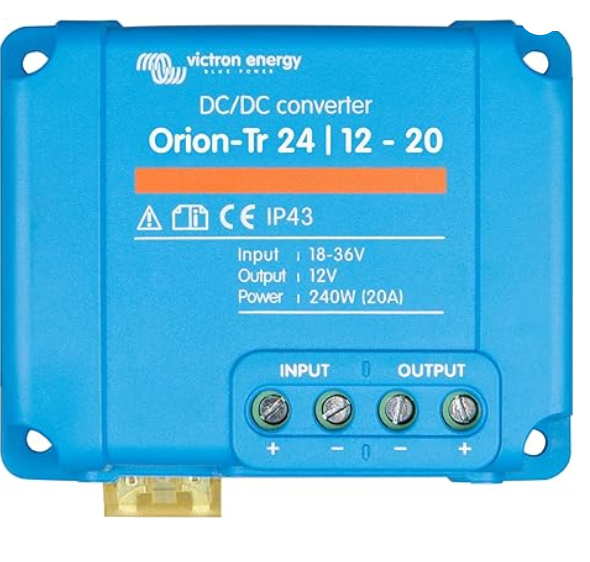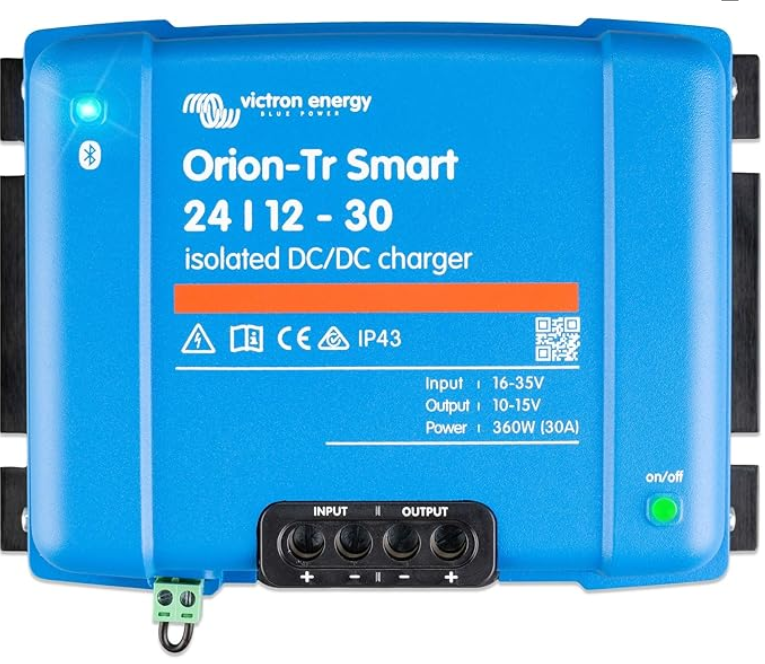Off-grid solar power systems often operate at higher voltages like 24VDC for efficiency reasons, especially in systems with significant power demands or long cable runs.
Understanding the Need for Conversion
- Efficiency in Solar Systems: Higher voltage systems (like 24V and 48V) reduce energy loss over long distances, making them preferable in off-grid setups. These systems are also cheaper to make. Read my article about 12V VS 48V.
- Compatibility with Devices: Many off-grid applications, particularly in RVs, boats, or remote cabins, use 12V appliances (lights, pumps, electronics).
Converting from 24VDC to 12VDC is a common requirement in these systems. Here’s an overview of how this can be achieved effectively:
Buck Converter (Generic)

- Functionality:
- A buck converter is a type of DC-DC converter that steps down voltage from a higher level (24V) to a lower level (12V) while attempting to maintain efficiency.
- It works by switching a transistor on and off rapidly, controlling the time the voltage is applied to an inductor.
- Cost-Effectiveness:
- Generally, buck converters are more affordable than specialized brand-name converters.
- They are a go-to choice for budget-conscious setups or DIY projects.
- Efficiency:
- These converters can be quite efficient, often above 90%, depending on the quality and design.
- Efficiency may vary under different load conditions.
- Limitations:
- Generic buck converters might lack advanced features like overcurrent protection, thermal shutdown, or voltage regulation under varying load conditions.
- The build quality can vary significantly between different manufacturers.
Victron DC-DC Converter

- Brand Reputation:
- Victron Energy is known for its high-quality power conversion and energy storage solutions, widely used in off-grid solar systems.
- Their DC-DC converters are designed specifically for demanding applications.
- Features and Reliability:
- Victron DC-DC converters offer stable output voltage, high efficiency and are built to handle fluctuating loads effectively.
- They often include advanced features like over-voltage protection, over-temperature protection, and overload protection.
- Integration with Solar Systems:
- Victron converters are designed to integrate seamlessly with other Victron components, making them ideal for systems already using Victron products.
- They often support monitoring and control via Victron’s system management tools.
- Cost:
- Victron converters are typically more expensive than generic buck converters.
- The build quality, reliability, and additional features justify the higher price.
What is the difference between the Victron Orion and the Victron Orion-TR smart?

Victron Orion Standard
- Function: Basic DC-DC conversion.
- Controls: Physical adjustment controls for voltage and current.
- Connectivity: No remote monitoring or control.
- Use Case: Best for simple, set-and-forget applications where constant output voltage is needed.
Victron Orion-Tr Smart
- Function: Advanced DC-DC conversion with similar core functionality.
- Controls: Remote adjustment via Bluetooth and a dedicated app.
- Connectivity: Enables remote monitoring and control, providing real-time data and alerts.
- Use Case: Ideal for complex systems requiring frequent adjustments, monitoring, and integration with smart systems and car alternators.
Key Differences
- Smart Features: Orion-Tr Smart offers Bluetooth connectivity for remote control and monitoring, unlike the standard Orion.
- User Interface: The Smart version allows for easier and more precise adjustments through an app.
- Price: Orion-Tr Smart is typically more expensive due to its advanced features.
Choosing Between the Two
- Budget Considerations:
- If cost is a primary concern and the application is relatively simple, a generic buck converter might suffice.
- For critical applications or where additional features are needed, the Victron converter is a better choice.
- System Compatibility:
- For systems already equipped with Victron products, their DC-DC converter will ensure compatibility and ease of integration.
- In standalone applications or as part of a diverse set of components, a generic buck converter can be a practical choice.
- Load Requirements:
- Evaluate the power requirements of your 12V devices. Ensure the chosen converter can handle the maximum current draw.
- Durability and Longevity:
- Consider the environmental conditions and operational demands. Victron’s products are known for their durability in harsh conditions.
Conclusion
The choice between a generic buck converter and a Victron DC-DC converter in an off-grid solar system largely depends on budget constraints, system integration needs, and the importance of reliability and advanced features. While Victron offers high-quality, feature-rich products, generic buck converters can be a cost-effective solution for simpler, less demanding applications.

I’m an off-grid enthusiast. I created this website to give clear and straight-to-the-point advice about solar power. I’m also the author of the book ‘Off-grid solar power simplified‘. Read more about me on my about page, check out my Youtube channel, or send me a message.